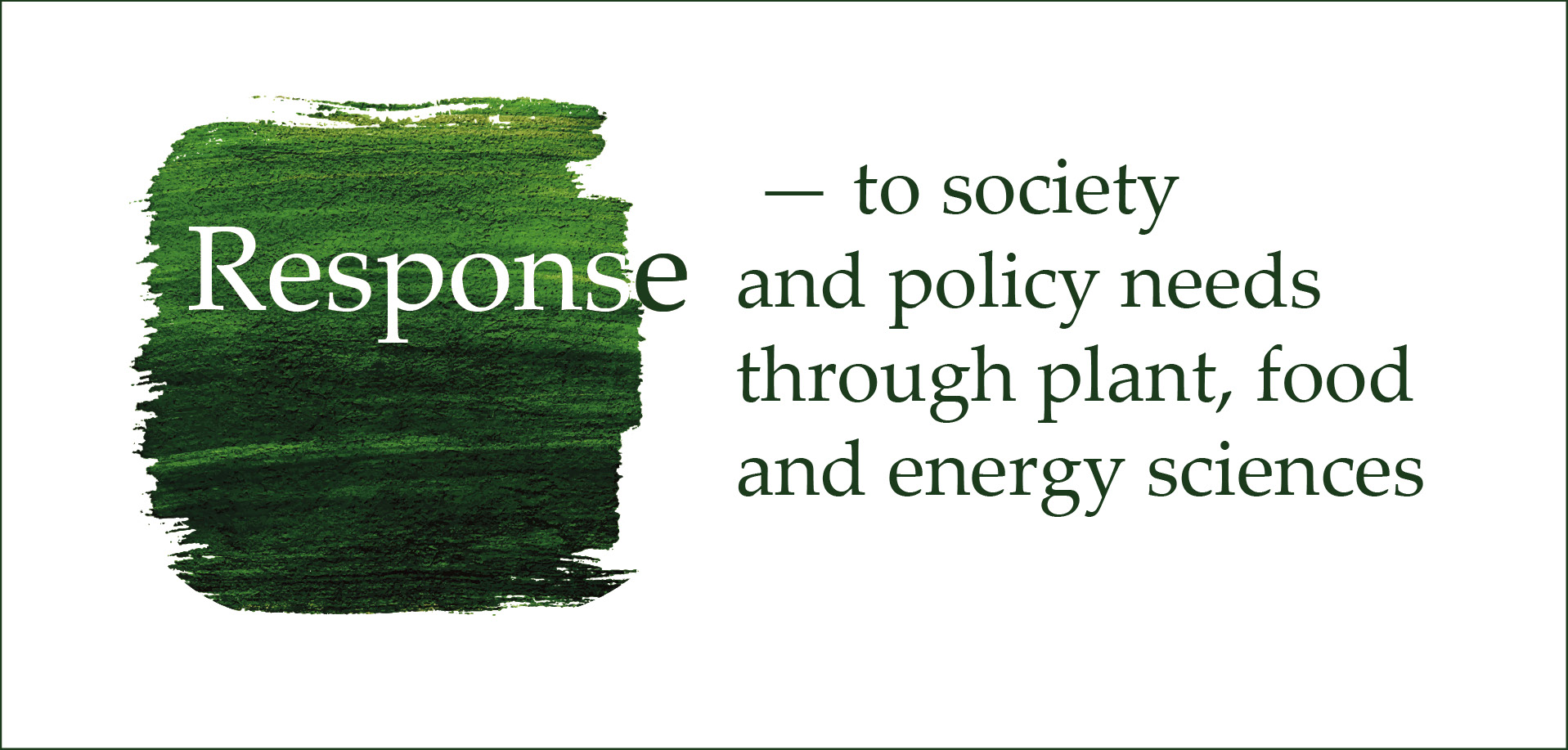RESPONSE Doctoral Program
The RESPONSE Doctoral Program (DP) «RESPONSE - to society and policy needs through plant, food and energy sciences» was funded by the European Union’s Horizon 2020 research and innovation program under the Marie Skłodowska-Curie Grant Agreement No 847585. RESPONSE DP built on the academic expertise of world-leading institutions - ETH Zurich and University of Zurich - and the three internationally renowned competence centers Zurich-Basel Plant Science Center (PSC), World Food System Center and Energy Science Center. RESPONSE DP was centrally managed by the PSC. It started in February 2020 and concluded in January 2025.
Research
After 4 calls for PhD candidates, 28 early-stage researchers (see projects) were recruited for 36 months (100%). They were working at the interface of science and policy, as well as science and innovation. 20 ESRs were employed at ETH Zurich and 8 ESRs at the University of Zurich. Their research projects addressed global challenges in the areas of sustainable food systems, sustainable energy systems and sustainable land use decisions.
Read more about the RESPONSE Projects
Watch the RESPONSE Fellows talking about their projects
Watch the RESPONSE Documentary
Collaborations and Secondments
While working in an international, interdisciplinary and innovative research environment in the natural, life and engineering sciences at one of the two host organization, the ESRs were co-supervised by renowned Partner Organizations, for example from industry, public and civil society organizations, non-governmental organizations or governmental organizations to transfer research results into policy or society. As a great success of this program, 28 secondments (= internships) of 3 to 12 months length have been completed.
Thanks to the secondment partners and collaborators: MWSchmid GmbH (MWS), Switzerland; International Maize and Wheat Improvement Center (CIMMYT, Mexico); Schweizerische Energiestiftung (SES), Switzerland; Swiss Federal Office of Energy, Switzerland; Bitplane AG, Switzerland; Nitidae France; Royal Barenbrug Group, France; Research Institute of Organic Agriculture (FiBL), Switzerland; mi2-factory GmbH, Germany; Schweizer Obstverband/Swiss Fruit Union, Switzerland; DLF Seeds & Science, Denmark; PSI (Photon Systems Instruments), Czech Republic; epibreed AG, Switzerland; ProSpecieRara, Switzerland; WWF US (USA); Swiss Academy of Sciences, Swiss Biodiversity Forum, Switzerland; Face the Future (Netherlands, Uganda); Syngenta Crop Protection AG, Switzerland; South East Asia Rainforest Research Partnership (SEARRP), Malaysia; OECD Sahel and West Africa Club, France; International Institute for Sustainable Development (IISD), Netherlands; Office for Nature and Environment Grisons, Switzerland; Puregene AG, Switzerland; ZHAW Zurich University of Applied Sciences, Switzerland; Halba, Switzerland; RWE Renewables GmbH, Germany.
Training and Mentoring
ESRs were/are matriculated at either ETH Zurich or University of Zurich or depending on the academic supervisor’s location with a PhD awarded after successful completion of a PhD thesis. All applicants followed the PSC PhD Program Science and Policy that is unique in its kind. Through the curriculum of this program, PhD fellows were trained in the communication of scientific evidence to policy-makers and the public; the involvement of different stakeholder groups as well as in policy development and endorsement in Europe and at global scale.
Throughout the program, a unique training and mentoring offer has been provided:
- RESPONSE Summer School 2021
- Mentoring Workshops
- Integrative Workshops
- Science and Policy Talks
Events and Stakeholder Engagement
RESPONSE fellows were involved in numerous outreach activities which included a wide range of target-actions aiming to transfer and discuss research outcomes with different parts of society. Among others, each RESPONSE was supposed to attend at least one stakeholder event on one of the RESPONSE subjects. Read more about the:
Outcomes and Publications
The program's and fellows success stories and achievements have been widely celebrated, with some being published in scientific journals or featured as newsletter articles, blog posts, and other formats, along with dedicated efforts to promote them across social media platforms.

This program receives funding from the European Union’s Horizon 2020 research and innovation program under the Marie Skłodowska-Curie grant agreement No 847585 - RESPONSE.

